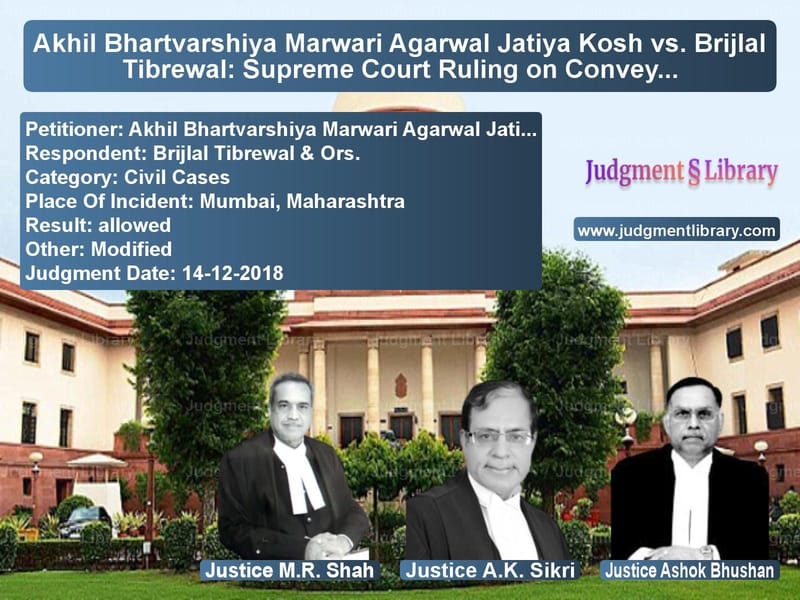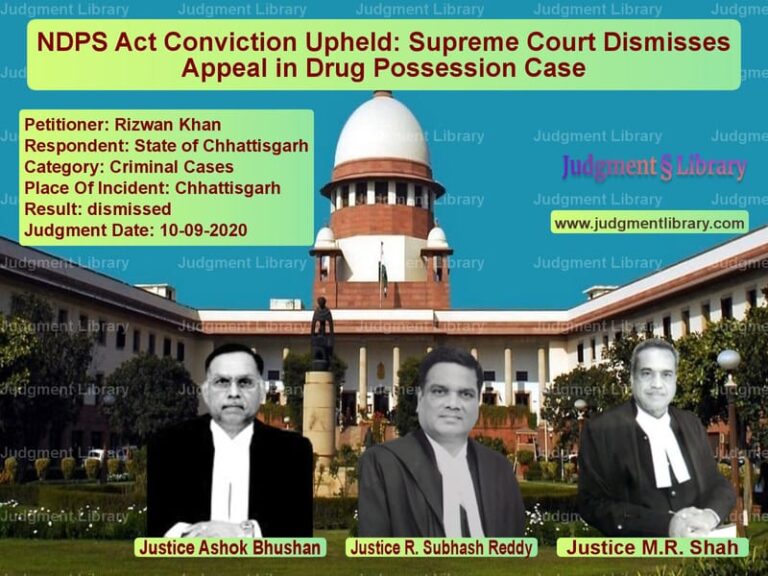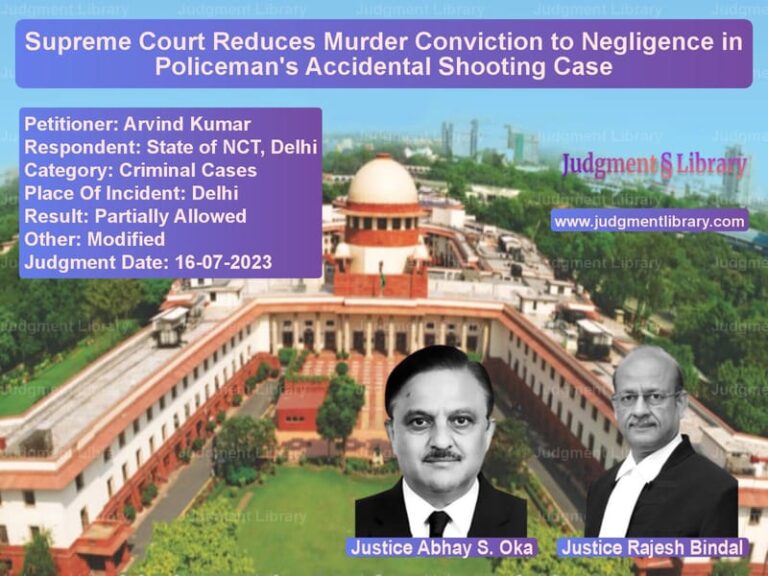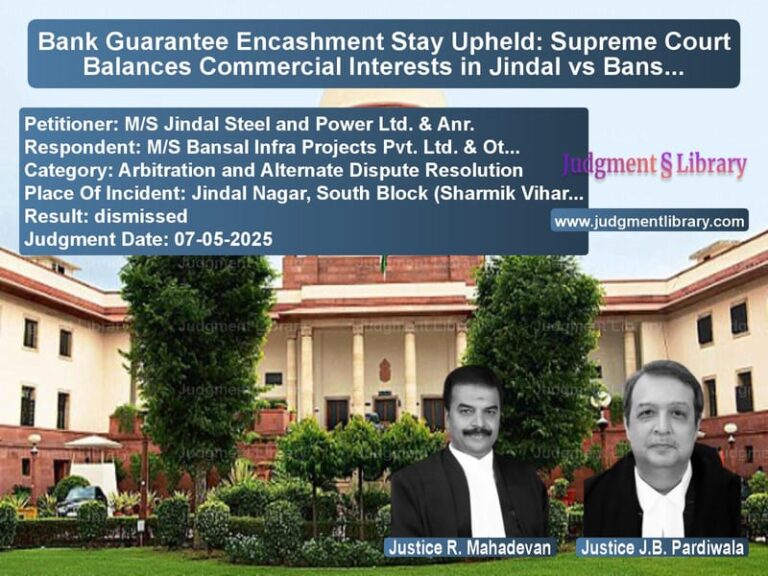Akhil Bhartvarshiya Marwari Agarwal Jatiya Kosh vs. Brijlal Tibrewal: Supreme Court Ruling on Conveyance of Land
The Supreme Court of India, in the case of Akhil Bhartvarshiya Marwari Agarwal Jatiya Kosh vs. Brijlal Tibrewal & Ors., resolved a dispute over the conveyance of land and the rights of flat purchasers in a cooperative housing society. The case involved multiple appeals against orders passed by the High Court regarding the execution of a conveyance deed for land in Mumbai. The judgment clarifies the legal responsibilities of promoters and trustees in relation to land conveyance, the execution of building plans, and the rights of the flat purchasers under the Maharashtra Ownership Flats Act (MOFA).
Background of the Case
The dispute in this case arises from a land parcel in Chinchavli, Malad (East), Mumbai, which was registered under the Bombay Public Trusts Act, 1950. The appellants, a registered trust, acquired a total land area of 9797 sq. meters for charitable purposes, including the construction of housing for weaker sections of society. The construction of Building A-1 was completed in 1978, with 20 flats allotted to the original flat purchasers. However, despite receiving possession, the appellants failed to complete the formalities, such as obtaining occupation certificates, forming a cooperative housing society, and conveying the land to the flat purchasers.
Petitioner’s Arguments (Akhil Bhartvarshiya Marwari Agarwal Jatiya Kosh)
The appellants argued:
- The Trust had acquired the land for charitable purposes and had already completed construction for the flat purchasers. The responsibility to form a cooperative housing society and convey the land was vested with the appellants.
- The flat purchasers had paid the full purchase price for their respective flats but had not received the promised conveyance of land despite the long delay.
- The appellants had complied with the relevant requirements under the Maharashtra Ownership Flats Act, 1963 (MOFA) but had faced difficulties due to external factors, including the Urban Land Ceiling Act.
- The appellants had not been able to complete construction on the remaining land, as it was declared surplus under the Urban Land Ceiling Act.
- The appellants sought clarification on the area of land to be conveyed, as the flat purchasers claimed rights to an area larger than what was actually constructed.
Respondents’ Arguments (Brijlal Tibrewal & Ors.)
The respondents, the flat purchasers, countered by stating:
- The Trust had failed to honor its commitments, including forming the cooperative society and conveying the land.
- Despite paying the full purchase price for their flats, the respondents had not been given the legal rights over the land on which their flats were constructed.
- The respondents argued that they were entitled to the conveyance of land corresponding to the built-up area of their flats, which was approximately 1205 sq. meters, not more than that.
- The respondents claimed the Trust had violated their rights by failing to complete the necessary legal formalities.
Supreme Court’s Analysis and Judgment
The Supreme Court carefully reviewed the case, focusing on several key issues:
- Jurisdiction of the High Court: The Court analyzed the role of the High Court in modifying the order passed in the First Appeal, especially regarding the area of land to be conveyed. The appellants challenged the High Court’s decision to extend the conveyance to 2700 sq. meters when the area of the building was only 1009 sq. meters. The Court noted that the High Court had overstepped its jurisdiction by modifying the original decree in the absence of cross-appeals or objections from the plaintiffs.
- Applicability of MOFA: The Court reinforced the importance of the Maharashtra Ownership Flats Act (MOFA), which mandates that the Trust must form a cooperative society and convey the land to the flat purchasers upon completion of the building. It ruled that the Trust had not fulfilled these obligations.
- Calculation of the Conveyance Area: The Court agreed with the appellants’ contention that the area to be conveyed should correspond to the built-up area of the flats, i.e., 1009 sq. meters, and not the entire plot area. The Court also considered the layout plans and the fact that the flat purchasers had only paid for the flats and not the entire land.
Based on these observations, the Court ruled:
“In view of the reasons stated above, the impugned orders passed by the High Court dated 23.12.2014 passed below ‘Note for speaking to the Minutes’ in First Appeal No.466/2010 and the order passed in Civil Application No.1698/2015 in First Appeal No.466/2010 are hereby quashed and set aside.”
Final Judgment
- The Supreme Court ruled that the Trust was to convey the title of the land corresponding to the built-up area of the flats, i.e., 1009 sq. meters.
- The Court directed the appellants to execute the conveyance deed in favor of the cooperative society formed by the flat purchasers.
- The Court clarified that the land to be conveyed was only that which was occupied by the building and not the entire plot.
- The appeal was allowed, and the High Court’s order was set aside. The Court also directed the execution of the conveyance deed within six months.
Implications of the Judgment
This ruling has several important implications:
- Clarification on Land Conveyance: The ruling reinforces the idea that land conveyance must correspond to the built-up area of the property and not exceed the area actually occupied by the construction.
- Accountability of Promoters and Trustees: The judgment highlights the duties of promoters and trustees to ensure that all legal formalities, such as forming a cooperative society and executing conveyance deeds, are completed for flat purchasers.
- Consumer Rights in Real Estate: The decision underscores the rights of flat purchasers to demand timely conveyance of property and the formation of a cooperative society as per the terms of the Maharashtra Ownership Flats Act.
- Legal Precedent: This case sets a precedent for future cases involving similar disputes over land conveyance and the rights of flat purchasers in cooperative societies.
Conclusion
The Supreme Court’s decision in Akhil Bhartvarshiya Marwari Agarwal Jatiya Kosh vs. Brijlal Tibrewal & Ors. provides clarity on the rights of flat purchasers and the responsibilities of promoters and trustees in executing conveyance deeds. The Court’s emphasis on following the provisions of the Maharashtra Ownership Flats Act ensures that flat purchasers are not deprived of their rightful ownership of the land on which their flats are built. This decision serves as an important reminder for both developers and buyers about the legal obligations involved in real estate transactions.
Petitioner Name: Akhil Bhartvarshiya Marwari Agarwal Jatiya Kosh.Respondent Name: Brijlal Tibrewal & Ors..Judgment By: Justice M.R. Shah, Justice A.K. Sikri, Justice Ashok Bhushan.Place Of Incident: Mumbai, Maharashtra.Judgment Date: 14-12-2018.
Don’t miss out on the full details! Download the complete judgment in PDF format below and gain valuable insights instantly!
Download Judgment: Akhil Bhartvarshiya vs Brijlal Tibrewal & O Supreme Court of India Judgment Dated 14-12-2018.pdf
Direct Downlaod Judgment: Direct downlaod this Judgment
See all petitions in Property Disputes
See all petitions in Specific Performance
See all petitions in Consumer Rights
See all petitions in Judgment by Mukeshkumar Rasikbhai Shah
See all petitions in Judgment by A.K. Sikri
See all petitions in Judgment by Ashok Bhushan
See all petitions in allowed
See all petitions in Modified
See all petitions in supreme court of India judgments December 2018
See all petitions in 2018 judgments
See all posts in Civil Cases Category
See all allowed petitions in Civil Cases Category
See all Dismissed petitions in Civil Cases Category
See all partially allowed petitions in Civil Cases Category







